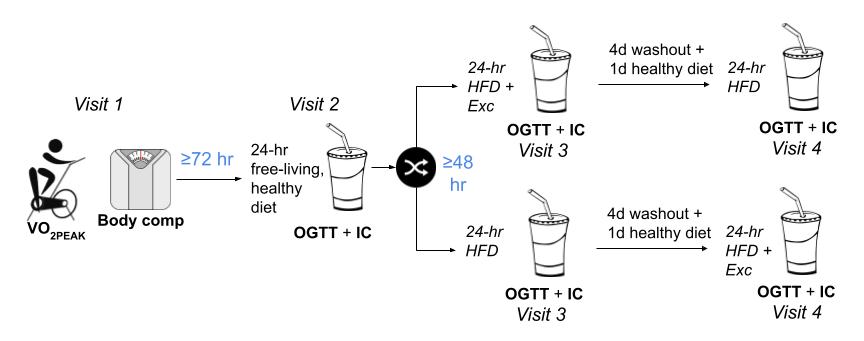Exercise and High-fat Overfeeding
An ongoing research study
What is our study? Excess caloric consumption contributes to nutrition-related chronic disease. In previous studies, a single high-fat meal has been shown to impair the body’s ability to correctly change metabolic function in a postprandial state. Exercise before a single high-fat meal is able to reverse these negative changes, but it is unknown how these findings extend to a full day of high-fat overfeeding. In this study, participants undergo a baseline oral glucose tolerance test (OGTT), where we assess fasting and postprandial arterial stiffness and use indirect calorimetry (IC) to assess metabolic flexibility. We also collect blood samples across the OGTT to measure glucose, insulin, fatty acids, and C-peptide. Following the baseline OGTT, participants complete two hypercaloric, high-fat diets, consuming 180% of estimated daily caloric expenditure with 65% of calories from fat. One HFD is done with exercise and one is done without exercise. Calories burned during exercise are replaced with additional foods. Collectively, this study will provide insight into the risk factors for adverse outcomes with overfeeding and the role of exercise in protecting against overfeeding-associated metabolic decline.

What skills have I gained from this study? This study serves as the basis for my doctoral dissertation. From this study, I am learning how to administer a free-living, overfeeding intervention in young adults. This will provide me with the experience necessary to conduct potential follow-up studies on exercise dose, exercise timing, and potential macronutrient- or population-specific effects. I am gaining skills in longitudinal data analysis, accelerometry for tracking of physical activity, management of a research intervention, and a better understanding of how to process and analyze food records. I will also deepen my understanding of postprandial metabolic and cardiovascular function, the metabolic effects of overfeeding, and the metabolic benefits of exercise.